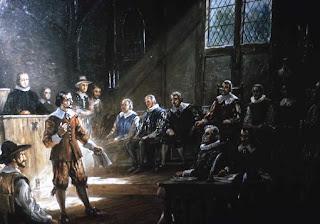While Spain and France had absolute monarchies, Britain's monarchy was limited. A limited or constitutional monarchy is a state in which the power of the monarch is checked by other constitutionally sanctioned institutions such as a representative assembly
On August 14, 1619, in Jamestown the first general assembly was held in a little church beside the James river. Thirty men were present. The body of men were called "burgesses" and were able to pass many laws as well as make many revisions to what was called the "Greate Charter."
Delegates to the newly created House of Burgesses were to be elected by the inhabitants of the colony, or the "freeman," a term that includes the indentured servants. Among the members of the assembly were a six member ggovernor's council, a speaker by the name of John Pory and twenty two burgesses who represented the plantations. Two from each of the eleven districts.
Among the first laws passed were ones that restricted personal behavior. Within six days, the burgesses had approved stern punishments against gambling, drunkenness, immorality, idleness, and excessive apparel. All colonists were required to attend two church services held every Sunday and they enacted a measure that required each city, borough, or plantation to educate the Indian children.
The House of Burgess was modeled after the English Parliament where members would meet at least yearly with their governor to decide local laws and local taxation. Most colonists, like their European counterparts, assumed great men should bear the responsibility of government.
In 1670, the House of Burgesses outlawed voting by poor men, permitting only men who headed a household and were landowners to vote.
The tradition established by the House of Burgess was paramount to colonial development by each new colony demanding its own legislature.
